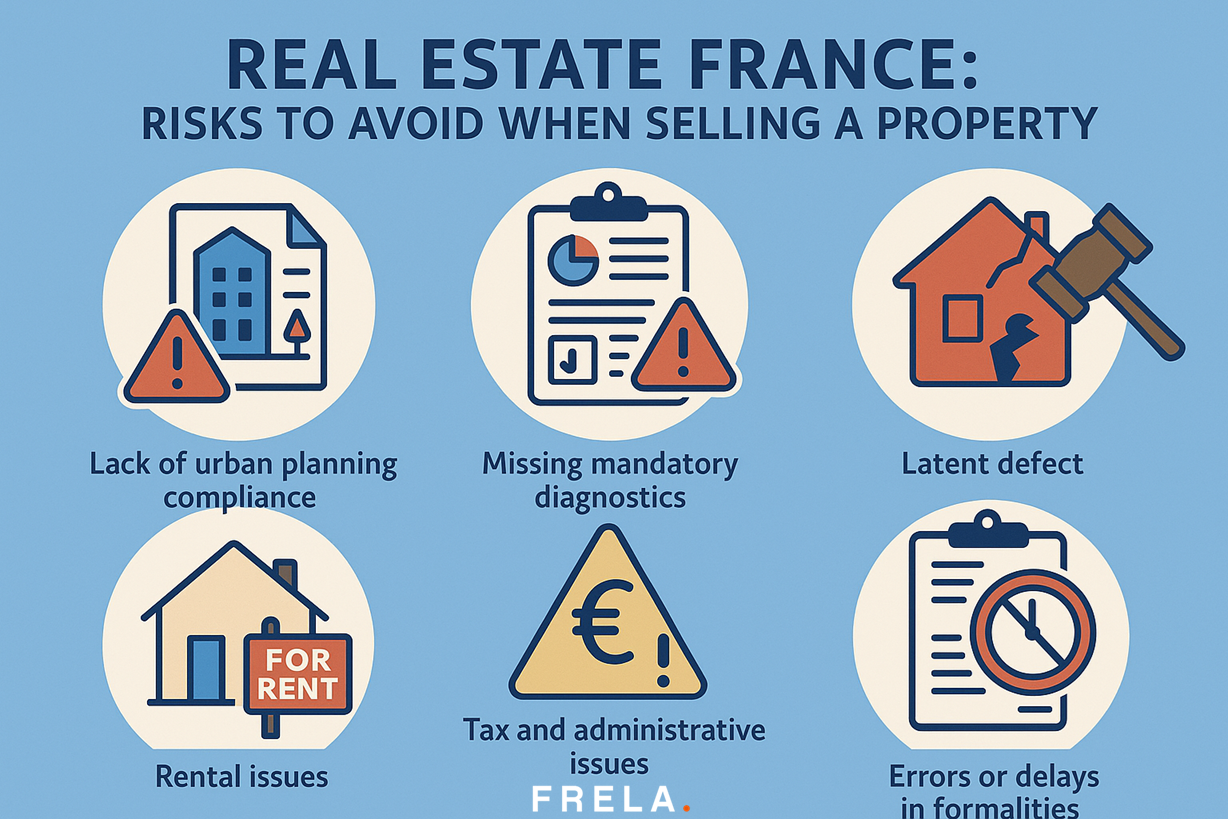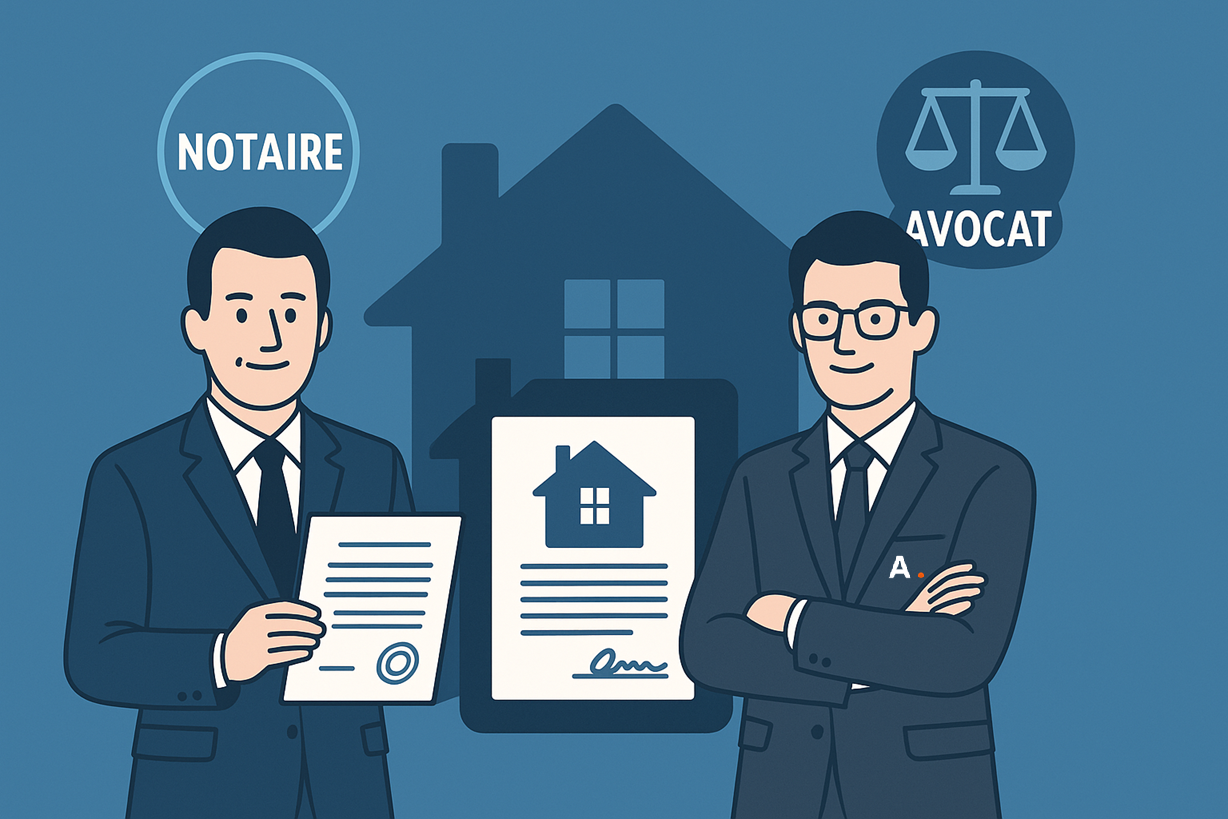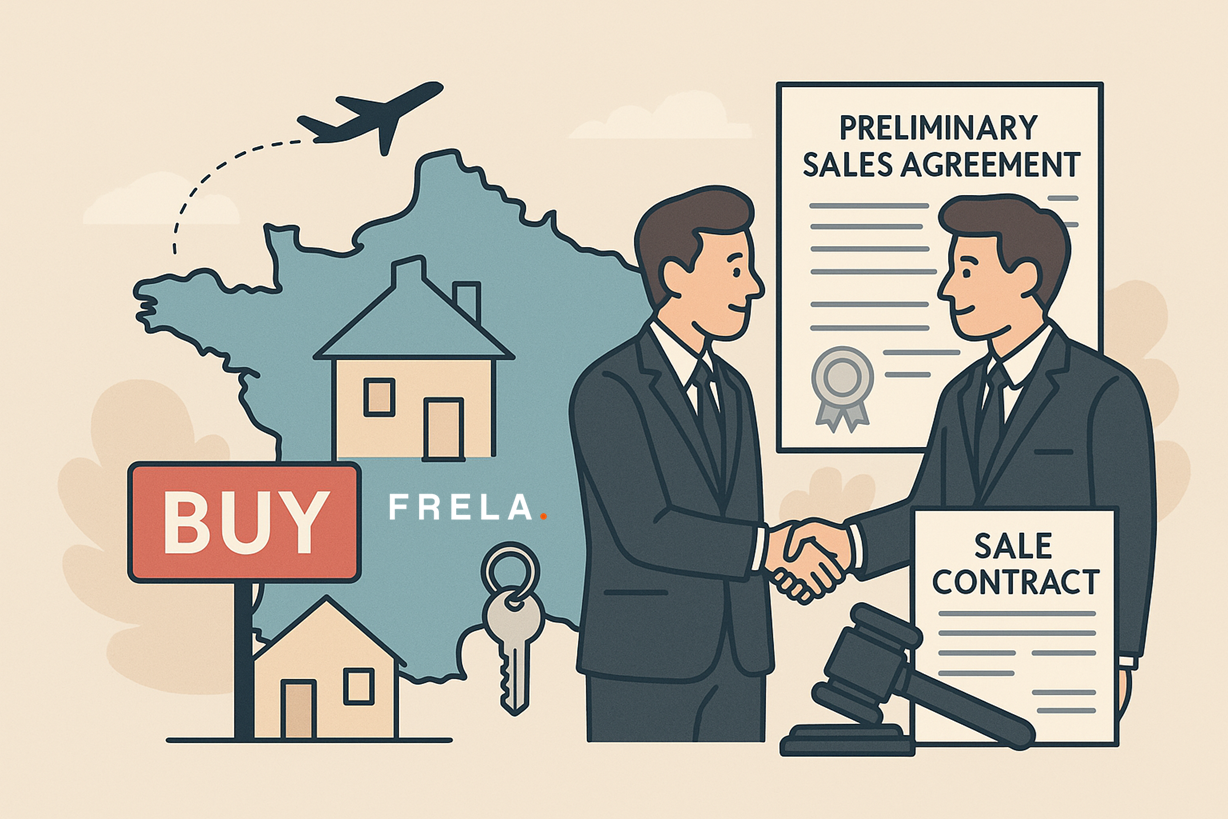Tax implications of a real estate sale for a Non-Resident
The taxation of the sale of real estate in France is a major aspect to consider by the non-resident seller. It mainly concerns the tax on the capital gain on the real estate realised on the sale, to which are added social security contributions, and possibly surcharges for high capital gains. Below, we detail the regime applicable in 2025, taking into account the particularities for non-residents and any exemptions.
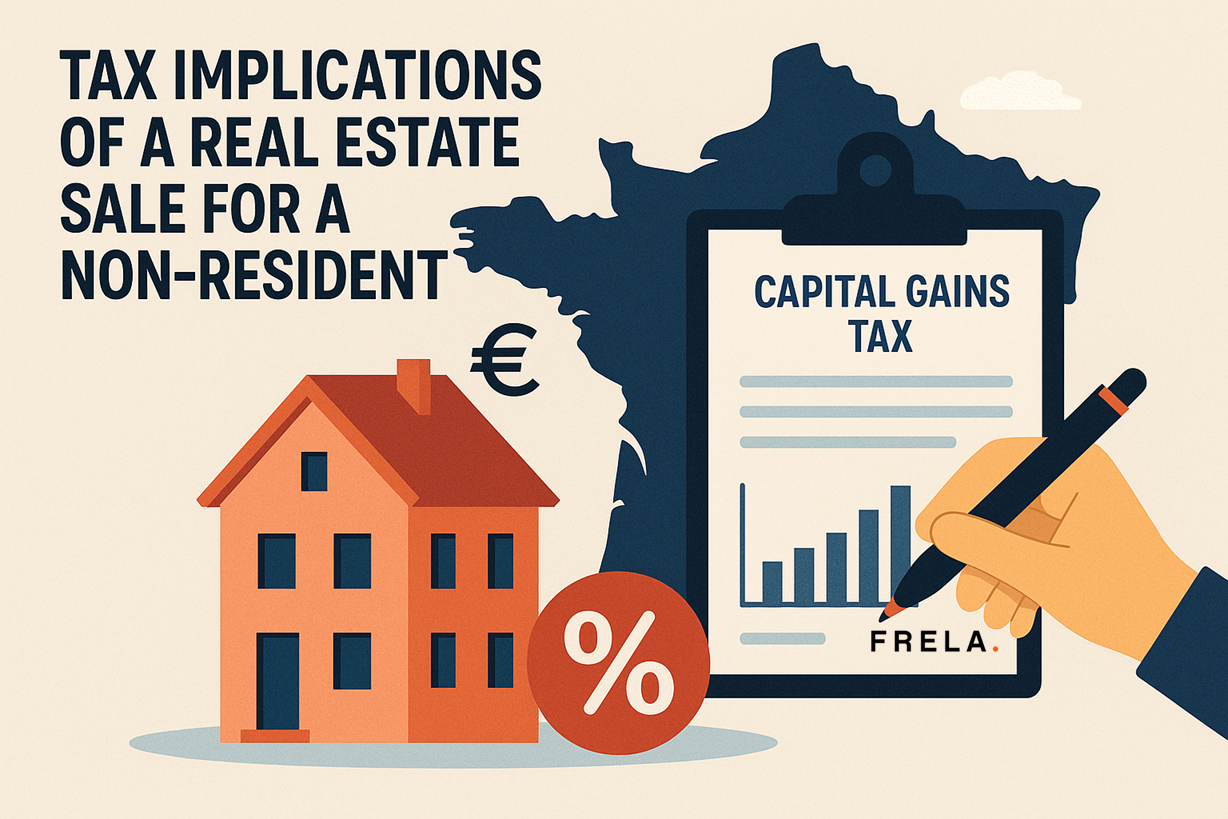
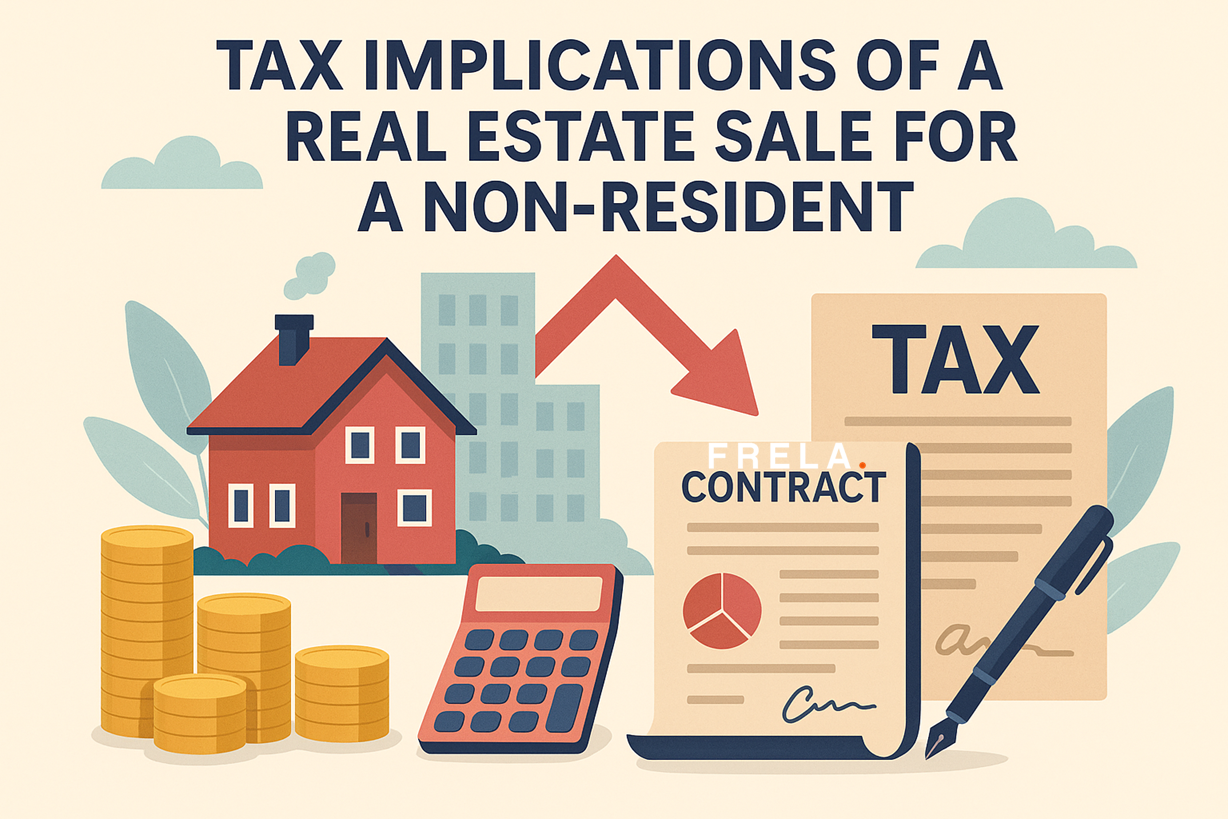
Calculation of the taxable capital gain:
The real estate capital gain is the difference between the sale price and the purchase price (plus acquisition costs and eligible works). The calculation method for a non-resident is identical to that for a resident: the seller can thus deduct from the sale price the notary fees and transfer taxes that he paid at the time of purchase (flat rate of 7.5% of the purchase price if the actual detail is not justified), as well as the construction, renovation or improvement work that he has financed (either for their actual amount on receipts, i.e. a flat rate of 15% of the purchase price if the property has been held for more than 5 years, even without invoices). After calculating the gross capital gain, any allowances for the holding period apply : from the 6th year of ownership, the seller benefits from a progressive allowance each year on the gross capital gain, leading to a total exemption from income tax after 22 years and social security contributions after 30 years. In 2025, the allowance is broken down as follows: 6% per year between the 6th and 21st year, then 4% in the 22nd year (which is 100% over 22 years) for income tax, and 1.65% per year from the 6th to the 21st year, 1.60% in the 22nd, then 9% per year from the 23rd to the 30th year (100% at 30 years) for social security contributions. In practice, a non-resident who sells a property that has been held for, for example, 10 years will benefit from the same allowances as a French person to calculate his taxable capital gain.
Capital gains tax rate:
Once the net capital gain has been calculated, the applicable tax rate depends on the tax status of the seller (natural or legal person). For a non-resident natural person, the tax rate on real estate capital gains is 19%, regardless of their country of residence. This flat rate, aligned with that of residents, has applied uniformly since 2015 (previously, non-EU residents were taxed at 33.33% but this difference has been removed to ensure equal treatment). The 19% deduction made at the time of the sale is dischargeable: the seller has no other tax to pay on this gain in France or to declare it afterwards. As a reminder, this rate applies after any allowances, which greatly reduces the tax burden in the event of long holdings. It should be noted that if the seller is a non-resident legal entity (e.g. a foreign company directly owning the property), the tax rate differs: capital companies (for corporate income tax) are subject to a levy of 25% (corporate income tax rate in 2025) or 33.33% depending on the case, while transparent partnerships (e.g. SCI not subject to corporate tax) are taxed in the name of the partners. In the case of an SCI owned by non-resident natural persons, the Conseil d’État confirmed that it is subject to the 19% rate on the capital gain, regardless of the country of residence of its partners (in practice, taxation is made in the name of each partner on his or her share of the gain, via form 2048-IMM).
Social security contributions:
In addition to capital gains tax, France applies social security contributions on the capital gains of real estate of individuals. Their overall rate is 17.2% (CSG, CRDS, solidarity levy, etc.) for French tax residents. For non-residents, the situation has changed in recent years. Since a ruling by the CJEU and legislative changes, non-residents affiliated to a social security scheme of an EU/EEA country or Switzerland are no longer subject to the CSG and CRDS on their real estate income in France. They remain liable for a solidarity levy of 7.5%. In other words, a seller residing in an EU country (or Switzerland) will pay 7.5% in social security contributions on his capital gain, instead of 17.2%. On the other hand, sellers residing outside the EEA (e.g. in the United States, Asia, etc.) remain subject to full social security contributions at the rate of 17.2%. These deductions are also deducted by the notary at the time of the sale, at the same time as the 19% tax. They do not give rise to a refund even if the seller’s country of residence has its own social protection, because it is legally a sui generis tax (in particular the solidarity levy). However, there is one notable exception: if the non-resident is affiliated to a European social security scheme, he or she will be able to claim the refund of the CSG/CRDS share (9.2%+0.5%) unduly deducted, even if there was only 7.5% solidarity left to be paid – this mechanism is now normally taken into account directly at the time of the sale.
Surtax on high capital gains:
France applies an additional tax on net real estate capital gains exceeding €50,000 (this surcharge concerns the portion of the real estate gain that is taxable, after allowances for duration, excluding building land). It is calculated by bracket: 2% from €50,000 to €100,000 of capital gain, 3% up to €150,000, 4% up to €200,000, 5% up to €250,000 and 6% above €260,000 (with a sliding scale allowance mechanism at the start of the bracket). This tax applies to non-residents as well as residents, in addition to the 19% + social security contributions, and is also retained by the notary when. For example, for a net taxable capital gain of €300,000, the surcharge would be around 6% of €300,000 = €18,000. The seller must take this into account in its net gain calculations.
Exemptions and special tax regimes:
In addition to the general exemption after 30 years of ownership, there are specific measures from which a non-resident may benefit:
-
- “Former residents” exemption (Article 150 U II-2° of the French Tax Code): This is a measure intended to favour expatriates who sell their former residence in France. It allows a non-resident to benefit from an exemption from capital gains tax, up to a limit of €150,000 of net capital gain, when selling a home in France. To be eligible, several conditions must be met: (1) the seller must be a national of the EU, Iceland, Norway, or Liechtenstein (note that the United Kingdom, since Brexit, is no longer included in this list, nor is a national of a country without an administrative assistance agreement); (2) the seller must have been a tax resident in France continuously for at least 2 years at a time prior to the sale (e.g. a French expatriate who lived and paid taxes in France for several years prior to his departure); (3) The transfer must take place no later than 31 December of the 10th year following the year in which France placement.meilleurtaux.com leaves for tax purposes. Beyond this 10-year period, the exemption is no longer granted, unless the property sold has remained at the disposal of the seller since his departure and has not been rented or occupied by third parties (in this case, there is no time limit to benefit from the exemption, which is intended to cover the case of a second home that the expatriate keeps for his use and that he sells more than 10 years after his departure). This exemption is limited to a single property per taxpayer and to €150,000 in capital gains. In concrete terms, if the capital gain realised exceeds €150,000, the fraction above that exceeds it remains taxable. The property sold must also have been the seller’s residence at some point in time (this arrangement is sometimes referred to as the “residence in France of non-residents” exemption). Please note: this exemption does not apply if the property is held via a company (SCI or other), the sale must be carried out directly by the natural person. A non-resident seller who meets these criteria will have an interest in providing the notary with the necessary supporting documents (residence permit in France, French tax notice for years of residence, etc.) to obtain this very advantageous partial exemption.
- Other exemptions: Of course, certain exemptions under ordinary law also apply to non-residents. For example, the exemption for the sale of a property < €15,000 if it is an isolated sale (which is not common for an entire property, this threshold is more aimed at the sale of undivided shares or isolated parking lots); the exemption for elderly or disabled people with modest incomes (subject to very restrictive conditions of tax income and ownership, this is a rare case for international investors); or exemption in the event of expropriation under certain conditions, etc. These cases remain marginal for a typical foreign investor, but they should be aware of.
Conclusion :
Ultimately, the standard tax regime for a non-resident who sells a property in France is as follows: 19% capital gains tax (after allowances for duration), + 17.2% social security contributions (unless reduced to 7.5% for EU/EEA/Swiss residents), + possible surcharge if there is a significant capital gain, all of which is deducted by the notary. This regime can be lightened by exemption schemes (30 years, expatriates <=10 years, etc.) or optimised by a good use of the rules (maximum deduction of work, etc.). To avoid any unpleasant surprises, a non-resident seller should have his unrealised capital gain estimated before the sale and to simulate the applicable tax, in order to include this tax cost in his calculation of the net proceeds of the sale.
About the Author :
Business lawyers, bilingual, specialized in acquisition law; Benoit Lafourcade is co-founder of Delcade lawyers & solicitors and founder of FRELA; registered as agents in personal and professional real estate transactions. Member of AAMTI (main association of French lawyers and agents).
FRELA : French Real Estate Lawyer Agency, specializing in acquisition law to secure real estate and business transactions in France.
Paris, 15 rue Saussier-Leroy, Paris
Bordeaux, 24 Rue du manège, 33000 Bordeaux
Lille, 40 Theater Square, 59800 Lille

This article is provided for general information only and may not reflect the most recent legal or tax developments. It does not constitute legal advice. Please contact us for personalised guidance before making any decision.

